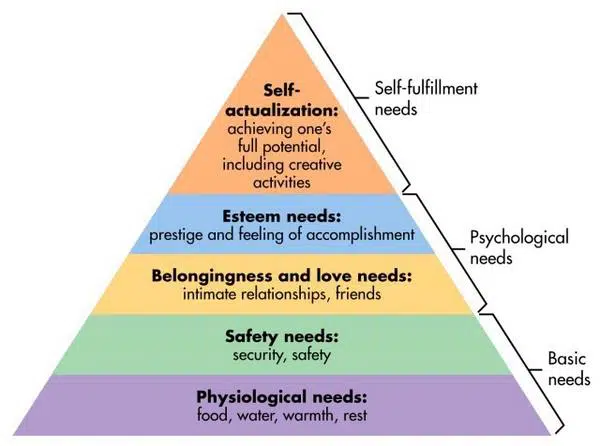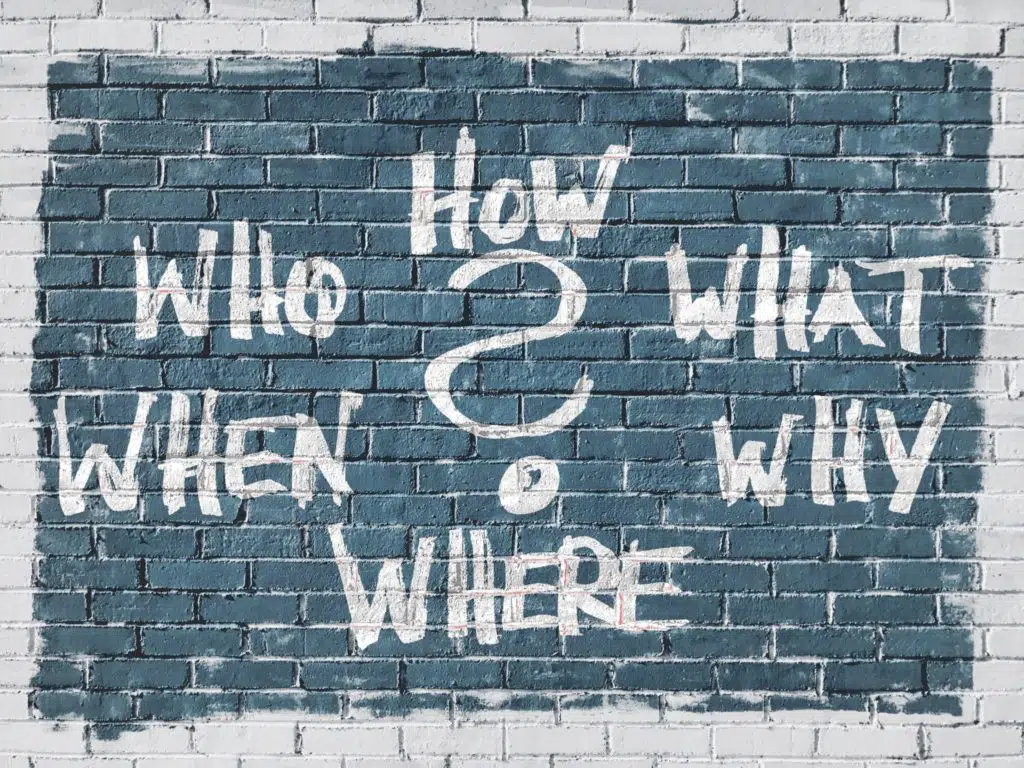So you’ve decided to become a life coach, or you are trying to build your toolkit to help you help your clients better. The first step is to ask the right life coaching questions to your clients to help them solve their problems more easily and understand the type of people that they are.
If you already are a life coach, you know by now that the most important part of coaching someone is getting to know them, and building a rapport with them. And you would have noticed by now that asking the right life coaching questions is critically important.
If you have not started on your journey to becoming a life coach, you’ll notice this soon enough.
The best way of getting to know somebody is to hold one-on-one sessions that can double up as interview sessions.
Client interviews are very important parts of the first stage of coaching where you get you get to know your clients. If you know them as an individual and what makes them tick, you can offer a tailor-made program to help them instead of having a programme that’s supposed to fit everybody.
Every life is unique, and everybody deals with their problems in their own way. The only way to actually help somebody is to understand their unique obstacles, and helping them overcome it.
Offering your clients a cookie-cutter solution would hurt more than it would help because when it fails to give your clients the results that they were hoping for, it would make them feel worse than they did at the start of the coaching process.
Of course, the coaching interview styles, techniques, and the types of life coaching question asked also changes depending on both client and coach.
There are many life coach questions and interview techniques. You will get different results depending on your interview style.
Some coaches tend to take a distanced approach, where the coach themselves are held in a position where they are approachable but yet retain a sense of infallibility.
This type of coach can be a big comfort to a client who feels safe when there is someone else in charge of their growth. You can use this style to help people who are unused to having any power or control in their own lives.
You can gradually get them used to the feeling of having more control over their lives, all without overwhelming them.
But be aware that maintaining a distance comes at the cost of camaraderie and frankness. To have a client be truly open and honest with you, you cannot retain any level of infallibility.
It is good for the clients to see you in control of your life, but if you appear to have no flaws (past or present), they are unlikely to admit their own flaws in front of you.
I recommend that you try a few things and see what works for you naturally, instead of assuming an identity that is fake. If you are natural and honest with your client to the best of your ability, they will be honest too.
Ok, now that we have talked about the styles of asking life coaching questions, let’s talk about their importance.
Why are life coaching questions powerful?
Communication is a bedrock of the coaching industry. If you communicate with your client well, you can help them better, more efficiently, and save a lot of time.
Communication is a three-step process, in which the channel of information holds its own place, so by using questions as a way of collecting information, you trim off a lot of inefficient exchange.
When you ask direct questions, you can do the following things:
- You reduce the possibility of misunderstanding
- You increase the chance of getting honest and direct responses
- You can direct the conversation flow effectively
- You can increase the accountability of all parties involved by using follow-up questions
Life coaching questions let you collect information, increase accountability, promote connectivity, initiate self-introspection.
If you know what questions to ask and how to ask them, you can up your game a lot as a life coach. The type of questions you ask can also help you set the tone and speed of the sessions.
What people don’t understand about the importance of life coaching questions:
People forget that it’s easier to hide and obfuscate the truth when we are communicating in a manner that is not direct.
When people are asked direct questions and then follow-ups, it is easier for clients to be honest with not only their coaches but themselves as well. Well-asked questions let you put people on the spot without making them feel uncomfortable.
Sometimes we all need to be honest and be put on a spot. How is anybody supposed to change their entire lives, break behavior patterns cultivated over a lifetime, when we can’t even face our own worst fears?
If we don’t know what is wrong, how can we fix it?
So don’t be afraid to ask uncomfortable questions. You are helping no one by keeping it super comfortable.
As a life coach or guide, it is your role to help people overcome something they can’t by themselves. So ask all that is important, it might help someone transform their lives completely.
Now before we discuss anything else, let’s look at the type of life coaching questions you should be asking.
Here is a list of 10 of my favorite questions to ask clients:
The right questions to ask:
The right kind of life coaching questions encourage a person to give the most relevant information, in the most honest manner.
The types of follow up questions you ask are very important as well because it would allow you to gauge the true authenticity of this exchange, and help the client understand their own thought process as well.
By following an active and visual questioning strategy, you will ask the questions that encourage clients to visualize their future, their actions, and the impact of their actions.
This is important for their growth. Remember, you are not a therapist. Your job isn’t to ask them to react to what is already happening in their lives.
Ask questions that foster a healthy level of self-introspection and belief.

When asking follow-up life coaching questions, use a technique that the tech people call ‘the 5-why analysis’.
The 5-why analysis encourages you to ask ‘why’ based follow up questions for each statement that links to a point of failure or dissatisfaction.
By following the answers to each follow-up life coaching question, we can get to the root cause of the problem, and hence solve that problem efficiently.
The picture given below is a representation of a model that is called a ‘fishbone diagram’.
It is used commonly in production processes, but there is no reason why it can’t be employed to follow any problem to its logical root.
Here are the questions that I think can help you start out correctly. Please remember to ask pertinent follow-up questions that best fit your client.
1. What are your goals?
Importance: Besides allowing you to start out by gauging the hopes and goals of your client, this also allows you to ask follow-up questions that let you gauge the importance of these goals.
This lets you draft an efficient growth plan and achievable tasks for your client.
Follow-up questions:
- Why?
- (fishbone/5-why, if necessary)
- Which of these is the most important goal?
- Which is the easiest goal?
- Which goal is more important to achieve RIGHT NOW?
- How would it change your life?
- What would you sacrifice for it?
- If you achieved this today, what would your life look like?
- If you had it, how would you protect it?
- What would you do after you achieve this?
Results: By asking this questions and its follow-ups, you can not only understand the power and importance these goals hold for your client, they can help you understand how they view said goals.

2. What is most valuable to you?
Importance: Besides allowing you to gauge what’s important for your client, this also allows you to ask follow-up questions that let you gauge their values, the way that they think about the important things in their lives.
This is a powerful question that can help you client re-evaluate their needs and what they hold dear. Often we think that we need something, but we only desire them. This question allows you to draw that distinction clearly.
Follow-up questions:
- Why?
- (fishbone/5-why, if necessary)
- How important is it?
- If you could buy it/sell it, what monetary value would you assign to it? (where appropriate)
- How do you/would you protect it?
- If you had the best of this in the manner that you wanted, would it improve your life?
- How does it impact you and your life?
Results: By asking this questions and its follow-ups, you can not only explain the differences between needs and wants, you can also help them visualize what is important.
3. What motivates you?
Importance: This question helps your client ascertain what motivates them, to what degree, and in what manner. This also helps you set up an efficient reward-accountability programme for your client in a way that has the most impact.
This is also a powerful question that can help your client re-evaluate their needs and what they hold dear.
Follow-up questions:
- Why?
- (fishbone/5-why, if necessary)
- What motivates you the most?
- In what manner?
- To what degree does it motivate you?
- How do you use it?
- Does it actively motivate you change something immediately?
- Does it have a long-term positive impact?
Results: By asking this questions and its follow-ups, you can not only explain how to use these motivations to trigger the most impact, you can also explain the impact of negative associations long-term.
Using something you are afraid of might work in the short-term, but fear-based motivation is not healthy and can cause people to get desensitized to that fear.
You can use the answers given here to start a discussion on positive reinforcements and how they can help your client feel more in control of their life.
If you want to learn more about how to grow your life coaching business by asking the right life coaching questions, build a six figure coaching business and learn how to get better results for clients in less than half the time, sign up for my launchpad here!
4. What are your obstacles?
Importance: This is one of the most important questions that you’ll ask your client. Every client wants to reach a point of success when they seek the guidance of a life coach, and these questions give you the most insight about the scope of your role in your client’s growth.
The follow-up questions you ask here need to be carefully tailored to each individual, and so don’t be afraid to add more question to the list that I give.
Follow-up questions:
- Why?
- (fishbone/5-why, if necessary)
- Which of these is affecting you the most RIGHT NOW?
- Why does it affect you and impact you so much?
- What are you doing to solve it?
- What do you think you can be doing to solve it?
- What timeline do you have for it?
- How can I help?
- If no changes are made and your life continues as is, how do you picture your life 1, 2, or 5 years from now?
Results: By asking these questions, you can help your client understand the action versus impact ratio of these obstacles.
Most people don’t take the required actions that will help them overcome their obstacles because they overestimate the effort the action would take, and they underestimate the impact of their obstacles.
You can help your clients figure out the correct level of difficulty of the tasks that they need to do, and you can reinforce who much impact their inaction has on their life.

5. If the biggest obstacle in your life was removed, how would your life change? (Visual)
Importance: As important as knowing the depth of your setbacks is, it is also important to be able to see the possibility of a life beyond them.
It is important to be able to imagine what they are working for.
The follow-up questions you ask here need to be carefully tailored to each individual, and so don’t be afraid to add more question to the list that I give.
Follow-up questions:
- Why?
- (fishbone/5-why, if necessary)
- How does this change your life in the terms of your goals?
- What would you do next?
- What is the next obstacle?
- Does this improve your life?
Results: Sometimes, it is easier to obsess over details of goals and tasks, than it is to imagine a truly successful future that is realistic. This questions can help your client set realistic goals that they can imagine and then work towards.
Overcoming obstacles is easier when you can see your life beyond them.
6. What parts of your life are unbearable to you?
Importance: Sometimes, we tolerate so many things that we get desensitized to a level of constant pain. What would be unbearable to someone else might not even register on our radar.
To have a truly healthy life and to cut negative behavior patterns out, it is important that we first realize what we tolerate and why.
Follow-up questions:
- Why?
- (fishbone/5-why, if necessary)
- How much impact does it have on your life?
- How would you change it?
- Would your life improve by dropping it?
- Visualize your life without it
Results: By realizing that what we consider unbearable can be removed from our lives, we gain a sense of control and independence.
If you have a client whose biggest problem is that they are constantly overwhelmed, this question and its follow-ups can help you get to the root of it, and thus, eliminate it.
7. What changes are you willing to make in your life right now?
Importance: In most of our lives, there is a huge divide between what we want to do, and what we a willing to do. We all want to do things that help us live a better life, but our real life reflects which of those tasks we are actually willing to do.
As a life coach, it is your job to help people make their lives by setting goals and tasks for them that they are willing to go through.
Here, it is important to be empathetic. If your clients aren’t being completely honest here, you will give them tasks that will either underwhelm or overwhelm them instead of helping them grow.
Follow-up questions:
- Why?
- (fishbone/5-why, if necessary)
- How would you do it?
- Can you picture doing it?
- How inconvenient it is for you to take this action?
- How would it change your life?
- What would you do next?
- Are you willing to be accountable for it?
Results: By letting them see the difference between the inconvenience that they associate with this action and the impact that this action would have, you can help them come up with a realistic strategy that is doable for them.
Don’t compare one client’s growth rate and achievements to another. Every client is unique and will grow in their own way.
8. What can you do today that takes you closer to your goals?
Importance: Now that we know what actions are doable for your client, it is important that immediate goals are set.
Procrastination doesn’t help anybody, and it only fosters depression and this feeling of not being able to control your life.
If immediate tasks are set and achieved, long-term goals can be reviewed and established.
Follow-up questions:
- Why?
- (fishbone/5-why, if necessary)
- How would you do it?
- Can you picture doing it?
- How inconvenient it is for you to take this action?
- Are you willing to do it?
- How does it affect your life?
- How would you keep yourself accountable for it?
- What is the next step?
- How can I help?
Results: This step will let you know how their willingness to do certain tasks fits into their willingness to start right away. Once you and your client can come to an understanding of what is doable, the process will be much smoother.
9. How do you reward yourself?
Importance: Impulse, rewards, convenience, pain, and comfort are all deeply interlinked and thus the way that we reward ourselves for a job well done may not be the best thing for us.
For example, consider that a person, who is trying to live a healthier and fitter life, rewards themselves with a pint of ice-cream after each work-out session. This reward does not fit into the pattern of behavior that is best for achieving their goals and is setting them back considerably.
We need to understand that there is a difference between what we need and what we want and that these two might never coincide.
According to Maslow’s theories, there is a hierarchy amongst needs, and we would be well-served to satisfy our needs in a proper order.

Follow-up questions:
- Why do you reward yourself in this manner?
- (fishbone/5-why, if necessary)
- What is reward-worthy to you?
- How do these rewards affect your life?
- Why do you think __ is a reward?
- What would happen if you stopped rewarding yourself?
- What is praise to you?
Results: This step will help your client understand how deeply rooted their rewards patterns are, and if they are actually good for them.
Use these questions to come up with a better reward/accountability programme for your client so that there is a sense of harmony between their rewards, their achievements, and their need to reward themselves.
10. What makes you happy?
Importance: Understanding what makes us happy, both long-term and short-term, is important. Take the happiness quotient quiz here.
Happiness is a factor of many things. Our environment, our nature, our nurture, our culture, and our community all affect our scale of happiness as much as what is happening in our lives.
For some people, happiness isn’t even something they care about, as long their needs are met; but for some people, happiness, no matter fleeting, can be more important than all other needs.
Follow-up questions:
- Why?
- (fishbone/5-why, if necessary)
- How happy are you right now?
- What is happiness to you?
- Is happiness important to you?
- How does being happy affect you?
- What would make you happy RIGHT NOW?
- Visualise your life 30 days from now, if no changes are made. How happy do you think you are at that moment?
- What has to change so you’ll be happy 30 days later?
Results: Once you know the gravity with which happiness affects your client, you can modify your plans accordingly. Remember to account for all the factors that affect that happiness level.
You may need to factor in some happiness-inducing activities within the progress plan, depending on the needs of your client.
Remember, these questions are just a tool in your kit as a coach. The types of coaching questions should change with your clients. Be empathetic, and check-in often.
Frequently Asked Questions (FAQs)
What is life coaching questions?
Life coaching questions are the exact opposite of what you might have seen in movies – a client asking the therapist all the questions and the therapist just listening, nodding, and making sense. That is not what life coaching is. Rather, life coaching consists of a trained professional asking the client numerous questions, opening up the client’s mind, and then the client will start talking. This is where the sessions will come alive, as the client will start talking about herself and her problems, her feelings, her worries, her goals, and so on.
What are powerful life coaching questions?
Powerful coaching questions have the potential to transform your life. It is important to realize that the more power you give to the question, the more power you are giving to the outcome. Your goal is to implement skillful and gentle questioning that guides you to a better future. The following are some powerful coaching questions. Ask yourself these questions. Meditate on your answers. How do you feel? How do you want to feel? What have you invested in? What have you given up? What do you want to invest in? What do you want to give up? How can you achieve this? Why do you want this? What is your next step?
What questions should a life coach ask?
A good life coach should ask questions that can lead to answers that help you reach your goals. Ask questions that will help you discover your passions and goals and then help you take steps to achieve them. Start by asking about the things you love to do, what makes you happy, and what you want to accomplish. Ask questions about your past, your family, your education, your interests, and what you’ve learned from it. Then ask questions that will lead you to the future you want. Ask about current obstacles and how you can overcome them. Ask about your strengths, your weaknesses, and about your hopes and dreams.









ABOUT SAI BLACKBYRN
I’m Sai Blackbyrn, better known as “The Coach’s Mentor.” I help Coaches like you establish their business online. My system is simple: close more clients at higher fees. You can take advantage of technology, and use it as a catalyst to grow your coaching business in a matter of weeks; not months, not years. It’s easier than you think.
AS SEEN ON
0 Comment